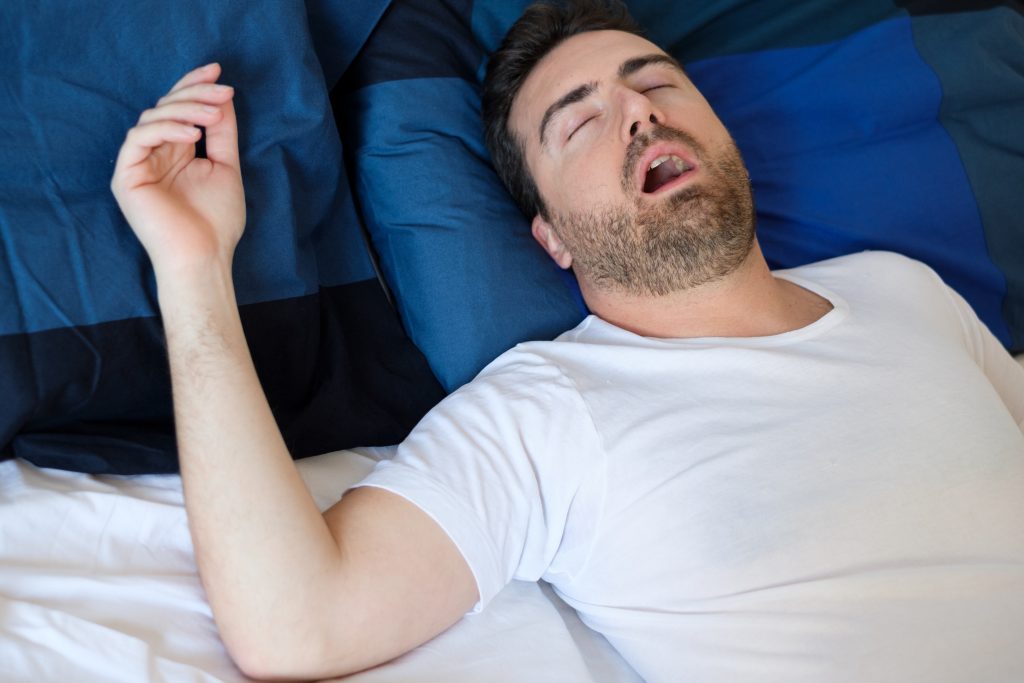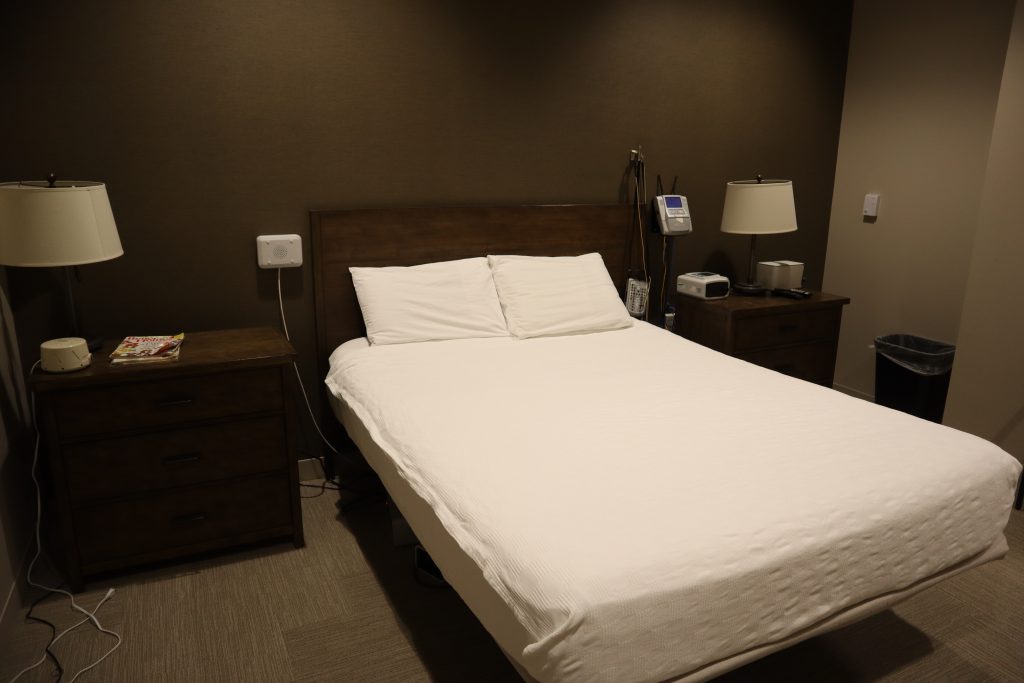August 11, 2022
Is sleep apnea genetic, or is the disorder that makes 30 million people stop breathing for short periods while they sleep caused by something else?
Is Sleep Apnea Genetic?
Plenty of us have been scolded with a gentle shake and an annoyed “stop snoring” in the middle of the night. We may have even startled ourselves awake a time or two. Snoring, choking and gasping could be signs of sleep apnea. With sleep apnea, people stop breathing for short periods of time—about 10 to 30 seconds—because their airway is blocked. This can happen up to 400 times a night!
 If you remember your dad making a racket after he dozed off in front of the TV, or your grandma snorting during her cat nap, you may think the apple doesn’t fall far from the tree. So, is sleep apnea genetic? Is sleep apnea hereditary? Does sleep apnea run in families?
If you remember your dad making a racket after he dozed off in front of the TV, or your grandma snorting during her cat nap, you may think the apple doesn’t fall far from the tree. So, is sleep apnea genetic? Is sleep apnea hereditary? Does sleep apnea run in families?
The answer to all three questions is “yes.” Yes, sleep apnea can be genetic. Yes, sleep apnea can be hereditary. And, sleep apnea can run in families. Researchers have actually identified several genes they think may contribute to the condition. These genes can be passed along to family members.
Still, other factors besides DNA can trigger the sleep disorder. Your primary care doctor or a sleep medicine specialist can help you identify which factors may be affecting your sleep. It’s important to understand the root causes to reduce your risks. Otherwise, you could be one of the nearly 30 million people in the U.S. who struggle with symptoms.
Along with feeling tired and sleepy during the day, sleep apnea can cause headaches, make it difficult to concentrate, and even trigger depression. It also boosts your risks for diabetes, high blood pressure, heart disease and stroke.
Is Sleep Apnea Hereditary?
Research shows that about 40 percent or less of all sleep apnea is due to genetics. If you have a first-degree relative (parent, sibling or child) who struggles with it, there’s a likelihood your sleep apnea’s hereditary. Since sleep apnea runs in families, let your doctor know if you have close relatives who struggle with the condition.
Even though sleep apnea runs in families, you could be compounding your condition with other risk factors.
Know the Risk Factors You Can Control
Since only about 40 percent of all sleep apnea is genetic, that means the lion’s share of cases—60 percent or more—are caused by health, environmental, and lifestyle factors. Here are important ones you should keep in mind:
- Obesity
- Alcohol
- Prescription sedatives
- Smoking
- Nasal congestion
- Sleeping on your back
Slim Down to Sleep Better
While sleep apnea can be genetic, the most common cause is excess weight and obesity.
During sleep, the muscles in your throat and tongue are more relaxed. Their soft tissue can actually block airways needed for normal breathing and prevent oxygen from reaching the brain. People who are overweight or obese often have more fatty tissue in the head and neck. This narrows the airways and makes breathing more difficult. Fat around the abdomen may prevent the chest and lungs from fully expanding and relaxing. Snoring, choking and coughing from sleep apnea is the brain waking you up so you’ll breathe.
Just as sleep apnea runs in families, so can obesity. Know your risk and try to reach and maintain a healthy weight. Losing weight can be the difference between struggling to breathe at night—or getting the sleep your body needs to rest and heal.
Stay Away from Substances That Slow Breathing
Alcohol, especially near bedtime, can make it harder to breathe during sleep. It relaxes the muscles in your throat. As a result, the upper airways in your throat collapse, causing sleep apnea.
The same is true of sleeping pills. Although they are supposed to help you relax and fall asleep, they can cause sleep apnea. Just as alcohol relaxes the throat muscles and causes the upper airway to collapse, sleeping pills do too. In fact, all medications that are muscle relaxers pose the same risk.
Be sure to tell your health care provider or pharmacist about all the prescription and over-the-counter medications you take. They will let you know if they are increasing your risk of sleep apnea whether your sleep apnea’s genetic or your sleep apnea is hereditary or due to other reasons.
How Is Sleep Apnea Diagnosed and Treated?
Frequent pauses in regular breathing during sleep can cause serious, long-term health issues. It’s important to seek treatment if you have trouble sleeping. Yet not enough people do. Of the 30 million who struggle with sleep apnea, only six million have been diagnosed and get treatment. Whether your sleep apnea’s genetic or caused by other factors, it’s important to see a health care provider.
 You may be referred to a sleep specialist who will talk with you about your symptoms, gather information about your medical history and perform a physical exam. Genetic tests may be ordered to see if your sleep apnea’s genetic or if your sleep apnea’s hereditary. Based on their findings, they may recommend you participate in a sleep study at a sleep lab.
You may be referred to a sleep specialist who will talk with you about your symptoms, gather information about your medical history and perform a physical exam. Genetic tests may be ordered to see if your sleep apnea’s genetic or if your sleep apnea’s hereditary. Based on their findings, they may recommend you participate in a sleep study at a sleep lab.
During the sleep study, sensors will be attached to your body to monitor your breathing while you sleep. Results from the study, can help care providers hone in on the proper diagnosis and treatment to help you.
Afterward, “continuous positive airway pressure therapy” (CPAP) may be prescribed. This treatment uses gentle air pressure delivered through a nasal device worn during sleep. A column of pressured air runs through the back of the nose to the back of the throat so it sits in the upper airway. Dental devices designed to keep the airways open are another solution. These treatments can be used whether your sleep apnea’s genetic or your sleep apnea’s hereditary.
Lower Your Chances of Sleep Apnea
It doesn’t matter if your sleep apnea’s genetic or if your sleep apnea’s hereditary or caused by lifestyle choices. There are positive steps you can take to help fend off sleep apnea.
Lose weight if you’re overweight. Dropping as little as seven to 10 pounds can help.
Stay active. Regular physical activity helps you maintain a healthy weight. It also gives your lungs a healthy work out so you can breathe easier.
Limit your alcohol intake. Avoid alcohol altogether or cut back. Don’t drink several hours before bedtime to avoid slowing or stopping your breathing.
Avoid other sedatives before bed. Like alcohol, sleeping pills and anti-anxiety drugs can relax muscles needed to keep airways open.
Quit smoking. It damages your lungs and narrows airways your body needs to breathe properly.
Don’t sleep on your back. Try sleeping on your left side. Research shows it increases blood flow and reduces snoring. Left-side sleepers have less sleep apnea—even for those whose sleep apnea’s genetic.
When to see a Doctor
If you suspect you may have sleep apnea due to your family’s history, schedule an appointment with your primary care provider. They will be able to determine if you are suffering from sleep apnea or another condition. Our providers at Healthcare Associates of Texas in DFW can diagnose and treat for sleep apnea.
DISCLAIMER
The information featured in this site is general in nature. The site provides health information designed to complement your personal health management. It does not provide medical advice or health services and is not meant to replace professional advice or imply coverage of specific clinical services or products. The inclusion of links to other web sites does not imply any endorsement of the material on such websites.